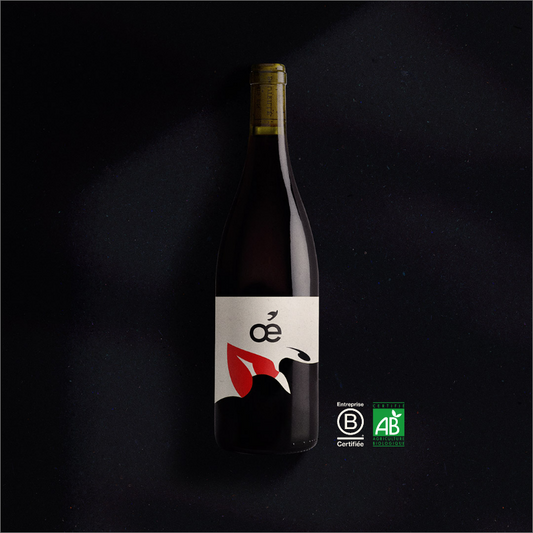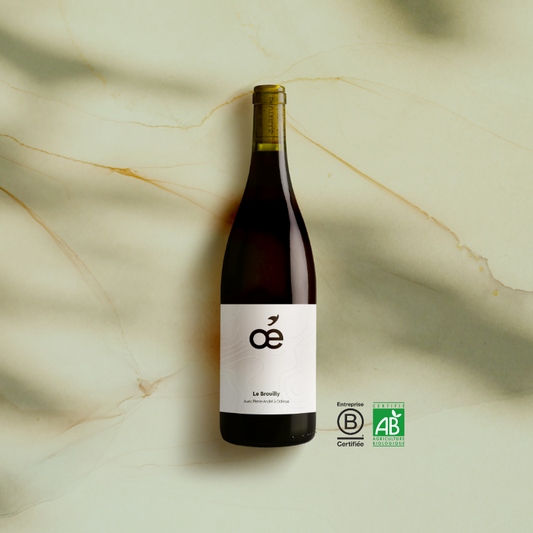Vegan wine , natural wine, labeled wine… Are you wondering how it works? To explain to you in a simple way, we asked our winegrowers questions to better understand what a vegan wine is. Let's take it all from A to Z!
What is a vegan wine?
Like the vegan diet, which consists of eating products without any animal substance, vegan wine is made from 100% vegetable matter. But if the first is rather easy to imagine (the diet), many of you are wondering about the second (the wine). When we know that a wine is produced from grapes, which itself comes from the vine, we say to ourselves that its composition can only be vegetable. Think again ! Already because many winegrowers filter their wine with what is called a "glue" (like egg white, fish glue, etc.). Then, some plow their vines with their horses. And yes, as crazy as it may sound, a wine cannot be labeled vegan if a horse is plowing the land.
What is "glue"?
Winegrowers filter their wines with a ''glue'' to remove yeast particles and residues suspended in the wine. This is called "clarification". To make the "fining" you can use egg white, fish glue, or even casein (particle present in milk). All these ingredients have animal origins and therefore are not vegan. And it is possible to do without it by using vegetable proteins such as peas, wheat or even potatoes. That's when the whole vegan wine approach made its show!
For the most determined winemakers, the even more natural solution to producing vegan wine is to not use glue at all. Yes it's possible. The wine produced will have just a little more settling than normal.
Vegan and organic, is there really a difference?
Even if their approaches are consistent, vegan wine and organic wine are significantly different. If the specifications for the production of organic wine prohibit the use of products such as gelatin or albumin made from animal blood, it does, however, authorize egg white and casein. A certified " organic " wine ( label AB ) is therefore not always vegan and vice versa. During the filtration of the wine, the winemaker uses a vegetable glue made from vegetable proteins or does not use any at all. If the wine is filtered, it is with processes such as cross-flow filtration - which is a process of filtering the liquid and the particles by their size and with the vegetable proteins just mentioned. This is how you get a vegan wine.
How to recognize a vegan wine?
French legislation is a little "lax" for wines from France , unlike other agri-food products. Basically, if a wine label presents the name of the domain, the appellation, the mention "contains sulfites" and "prohibited for pregnant women", etc. nothing obliges him to speak about the components of the wine. Consequently, the number of wines labeled vegan could be counted almost on the fingers of one hand, while many winegrowers respect its specifications and could be certified. At Oé, the wines are all vegan!
How to find your way through all this? You can go through labels with precise specifications such as Expertise Vegane Europe , Vegan Society or V-Label , and/or rely on the word of the winemaker. There are currently no regulations that require you to display the characteristics related to clarification (you know, the process we just talked about that allows you to filter suspended particles in wine) on the labels of your bottles. On the other hand, since 2012, wines must mention the presence of milk or egg for all people prone to food allergies. This is already a first step!
What are the differences between vegan, biodynamic and natural wines?
Choosing a vegan wine means wanting a wine that does not contain any products of animal origin and that did not require animal intervention during viticulture. Natural wines and biodynamic wines have no particular restriction in their specifications concerning the use of products of animal origin or the presence of animals in the vineyards . The winegrower can therefore use horn dung to fertilize the soil, or have horses to plow the soil. Vegan labels, on the other hand, prohibit these practices. You are therefore unlikely to see Numérobis shouting “allez hu canabis hu” in the vines of a domain that produces vegan wines .
To produce biodynamic wines and natural wines , the winegrowers practice organic viticulture as well as organic winemaking . This means that they do not use chemical pesticides ( chemical phytosanitary products) to protect the soil, no GMOs either and that they are turning to healthier and more responsible solutions .
Also during vinification, the winemaker pays particular attention to ensuring that his wine is as “pure” as possible and rediscovers nature from the first sip. The labels for biodynamic wines and natural wines only authorize native additives , in very small quantities, such as the level of sulfur which is very controlled. The sulphite doses of biodynamic wines are lower than those of organic wines, and those of natural wines are even lower. Some natural wines are even Without Any Inputs Or Added Sulfites (SAINS) .
If you're interested, we wrote an article on sulfite-free wines
Natural wines are generally very little modified because the credo is to respect the wine as it is. They are often referred to as living wines . During vinification, many winegrowers avoid fining , the stage used to clarify the wine by using a protein that can be found in egg white, fish glue, or the casein present in milk.
The philosophies of natural wines, biodynamic wines and vegan wines are different but can intersect and so you can find natural wines and biodynamic wines that are also vegan .
Taste a vegan wine
Vegan wine is there to please everyone. Young (not too much either) as well as adults, vegan or not, this wine is above all a source of pleasure that does not require any animal intervention.
Using bentonite or vegetable protein does not change the taste of the wine. You can fully appreciate the typicity of a good red wine and a good white wine from your favorite wine regions .
Are you ready to indulge yourself by cooking 100% vegan meals, from main course to wine? At Oé, our lunchtime discussions often revolve around food and wine pairings, because we love to share our tasting and blending tips . Our wonderful vegetarian Bourguignon recipe accompanied by its bottle of vegan wine is a taste treat. We like to have fun and bring out our great wines like our Châteauneuf-du-Pape , or our Crémant .
Speaking of wine tasting and fining, let us tell you an anecdote. Do you know the Bordelais canelés ? This very gourmet pastry uses egg yolks, and one theory says that its recipe was developed to avoid the waste of yolks, caused by the use of egg whites for fining wine. No one knows if this is the real reason for their existence, in any case, it gives us mouth water!
For all lovers of organic wine, we invite you to discover more about the wines of Côtes-de-Provence and Champagnes
The production of vegan and organic wines, in France
You will agree, we do not often see on a bottle “fined from egg white”, so it is difficult to know if the wine is vegan or not. In recent years, to meet growing demand and above all to bring more transparency to the bon vivants that we are, vegan wine consumers , labels have been stepping up their efforts.
There are also many wines that do not carry the vegan label and yet are. To help you find the vegan wine that will win you over, vin-vegetalien.com has created a directory of vegan wines. Practice !
Our French wine regions are doing their best to encourage positive approaches and winegrowers are increasingly committed to biodiversity. Many winegrowers are switching from conventional viticulture to organic viticulture, without forgetting winemaking of course. The sale of organic wines has been a resounding success and even large retailers are getting into it!
We can take our hat off to the South of France and in particular to the Languedoc Roussillon region. Known for its magnificent landscapes and its medieval center in Montpellier, Languedoc Roussillon is also the region with the most organic vineyards, with Bordeaux and Burgundy in its rearview mirror . The medoc better watch out!
The development of organic wine benefits vegan wine because it allows a greater knowledge of the different methods of wine production and to turn to a healthier and more responsible consumption. Soon, we hope, all our good wines from France and wines from around the world will be organic, biodynamic, natural and vegan .





